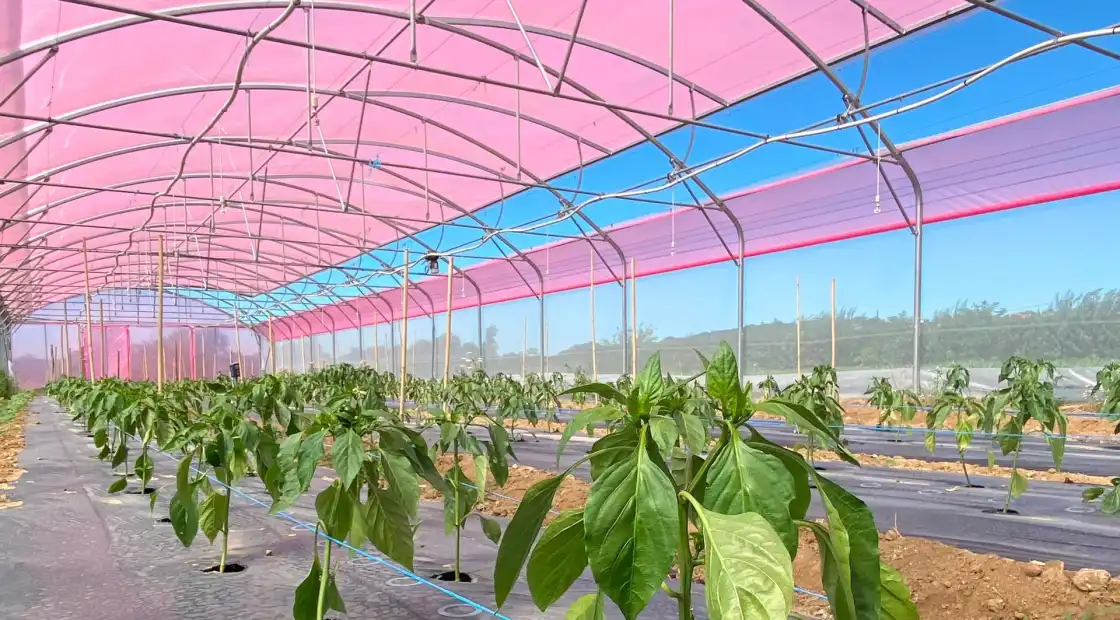Agricultural films with LUMINOUS CASCADE ®, a real lever for optimizing your crops under cover: results of the ECLA project

Agricultural films with LUMINOUS CASCADE ®: results and prospects of the ECLA project presented at SIVAL
Programmed by VEGEPOLYS VALLEY at SIVAL 2024, the presentation of the ECLA project by start-up CASCADE highlighted an innovative technology: photo-conversion agricultural films. These LUMINOUS CASCADE agricultural films are distinguished by their ability to transform certain solar rays of little use to plants, such as ultraviolet and green rays, into blue and red wavelengths, optimal for photosynthesis. Developed over several years, this innovation significantly increases photosynthetic efficiency and agronomic performance. Trials have revealed yield gains in excess of 10%, linked to optimized water consumption, enhanced disease resistance and improved fruit quality. These results have been confirmed by over 100 trials carried out on various crops and in different climates, demonstrating the reliability and adaptability of this technology under different conditions. What's more, thanks to a recently developed multi-season formulation, film performance is maintained over long periods.
The technology behind these LUMINOUS CASCADE agricultural films is based on advanced research into light and materials. After some fine-tuning, this innovation is now ready for practical use by market gardeners, thanks in particular to the film's extended lifespan, which makes it viable for use in greenhouses over several years. In addition, studies have shown that these films reduce the consumption of inputs such as fertilizers, while maintaining or even increasing yields. A key element is the improvement in the light diffused by the film, which is particularly beneficial in cases of low sunlight levels or when greenhouses are bleached.
Agronomic trials conducted in Europe and beyond on agricultural films with LUMINOUS CASCADE ®.
Agronomic trials presented in Angers demonstrated the significant impact of LUMINOUS CASCADE agricultural films on yields. For example, studies on strawberries and tomatoes revealed yield increases of between 8% and 14%, depending on conditions. On other crops, such as peppers or cucumbers, similar benefits were observed: better plant resistance to disease, increased earliness and reduced water consumption. In particular, the use of these films enabled inputs to be reduced by up to 15%, while maintaining high efficiency. These results confirm the robustness and adaptability of this technology in varied environments and contrasting climates.
Other trials have highlighted the beneficial effect on plant development cycles. Plants grown under these films show advanced flowering, enhanced reproductive development and improved nutrient uptake. The impact on agronomic results is not limited to increased yields. Fruit and vegetable quality is also optimized, with visual and nutritional characteristics improved or maintained. A significant reduction in water stress has also been observed, reinforcing the interest of this solution in the face of the challenges posed by climate change.
Looking to the future for multi-season films
The French market is about to welcome multi-season technology, which will be launched this year. Specifically adapted to vegetable crops and red berries, this innovation is compatible with long-term cultivation practices in France. In addition to yield, trials have shown improved plant health and reduced the impact of pests and diseases. For example, whiteflies, which are mainly harmful to cucumbers, were significantly reduced in some trials.
Environmental impacts were also taken into account with this project. A life-cycle analysis reveals that these films reduce the overall ecological footprint thanks to their ability to optimize inputs and increase yields. In terms of cost, although these films are more expensive than conventional versions, the agronomic gains and reduced inputs more than compensate for this, giving a clear economic advantage for growers. What's more, this innovation is fully in line with today's challenges of economic performance and sustainability.